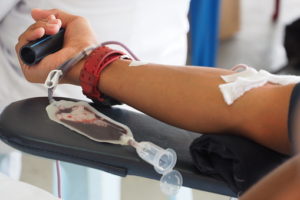Familial hypercholesterolemia (FH) a genetic disorder which increases the risk of cardiovascular disease 100-fold and affects approximately 1 in 250 individuals. FH is readily treated with statins and other cholesterol lowering drugs, although many individuals with FH are unaware of their condition. Based on a retrospective study of over one million donors in Texas from 2002 to 2016, screening blood donations may be an effective method to identify individuals with FH. In the cohort of 1,178,102 individual donors (3,038,420 blood donations) with a median age of 32 years (53% female), the median total cholesterol level was 183 mg/dL (IQR, 157-212 mg/dL). A total of 3473 individual donors (or 1 in 339) met the Make Early Diagnosis to Prevent Early Death non-fasting serum cholesterol thresholds for FH of 270, 290, 340, and 360 mg/dL for donors younger than 20 years, 20-29 years, 30-39 years, and 40 years or older, respectively. FH prevalence was higher in younger donors (<30 years; 1:257) than older donors (>30 years; 1:469; p<0.001) and in men compared to women (1:327 vs. 1:351; p=0.03). Screening blood donations may be an inexpensive, novel method to identify individuals with FH as well as reach out to family members who may also have the condition.
Reference:

